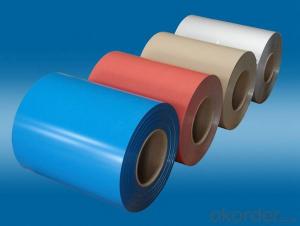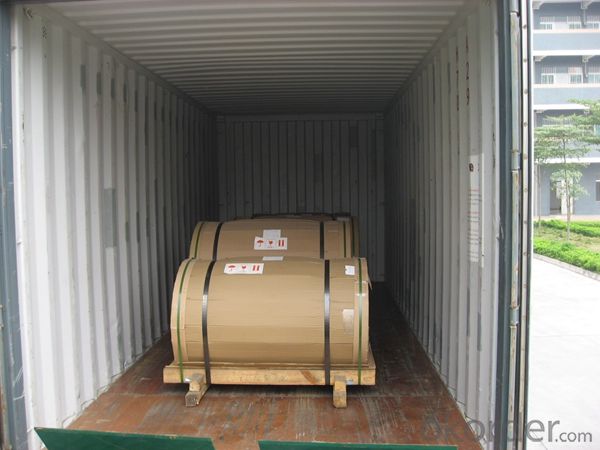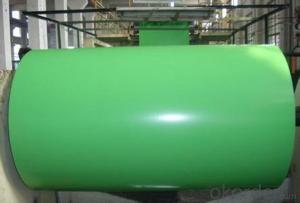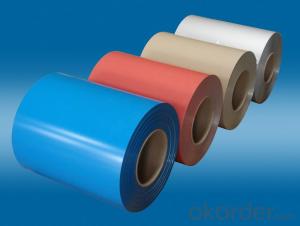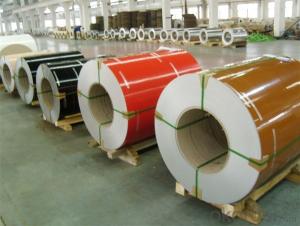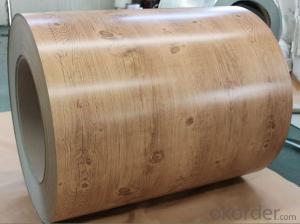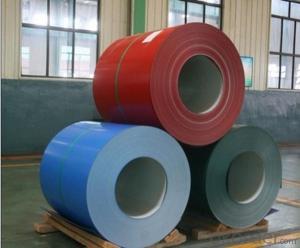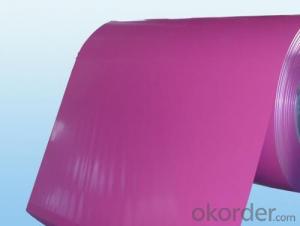Paint Aluminum Coil for Wall System
- Loading Port:
- Shanghai
- Payment Terms:
- TT OR LC
- Min Order Qty:
- 5 m.t.
- Supply Capability:
- 10000 m.t./month
OKorder Service Pledge
OKorder Financial Service
You Might Also Like
Specification
1. Specification of Color Coated Aluminum Coil for Wall System
characteristics | Application |
1) Super peeling strength | 1) Building exterior curtain walls |
2) Excellent surface flatness and smoothness | 2) Decoration and renovation additions for old buildings |
3) Superior weather, corrosion, pollutant resistance | 3) Decoration of interior walls, ceilings, bathrooms, kitchens and balconies |
4) Even coating, various colors | 4) Shop door decorations |
5) Fireproof, excellent heat and sound insulation | 5) Advertisement board display platforms and signboards |
6) Superior impact resistance | 6) Wallboards and ceilings for tunnels |
7) Lightweight and easy to process | 7) Industrial materials, materials for vehicles and boats |
2. Application of Color Coated Aluminum Coil for Wall System
(1).Interior: wall cladding, ceilings, bathrooms, kitchens and balconies, shutters, doors...
(2).Exterior: wall cladding, facades, roofing, canopies, tunnels,column covers , renovations...
(3).Advertisement: display platforms, signboards, fascia, shop fronts...
3. Feature of Color Coated Aluminum Coil for Wall System
*Such coil is specially designed to replace aluminum ingot, due to the high export tax of aluminum ingot, the coil has better price than ingot.
*This type of coil can fit customer's remelting furnace just like ingot, no need to make any change to the production line that was previously used for ingot. The standard coil size and weight is very suitable for the feed gate of furnace.
*This type of coil causes less material wastage than ingot when remelted.
*Our coil is made directly from ore, no need to go though the ingot making process, quality is much better than other suppliers who use ingot scrap to make coil.
Be free from Oil Stain, Dent, Inclusion, Scratches, Stain, Oxide Dicoloration, Breaks, Corrosion, Roll Marks, Dirt Streaks and other defect which will interfere with use
4. Certificate:
SGS and ROHS(if client request, paid by client), MTC(plant provided), Certificate of Origin(FORM A, FORM E, CO), Bureau Veritas and SGS (if client request, paid by client), CIQS certificate
5. Image of Color Coated Aluminum Coil for Wall System
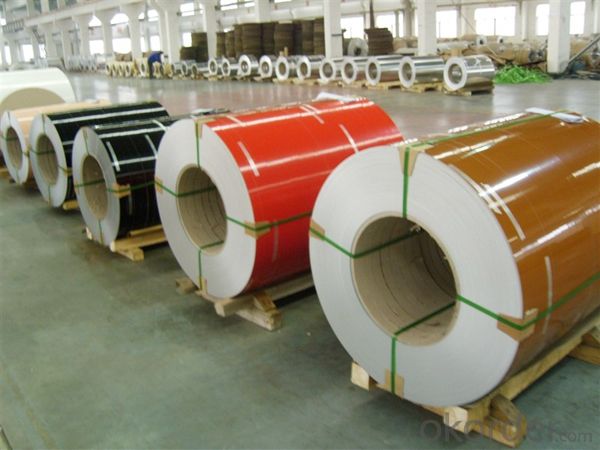
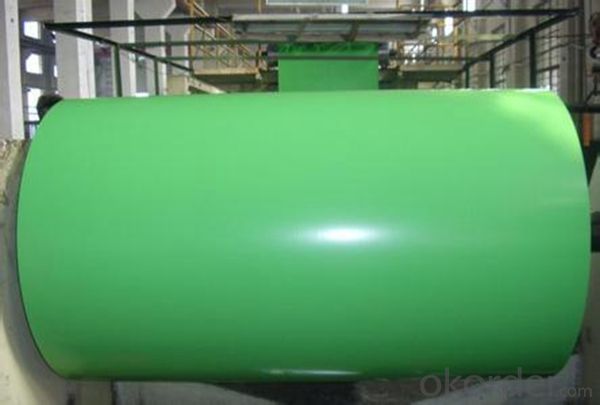
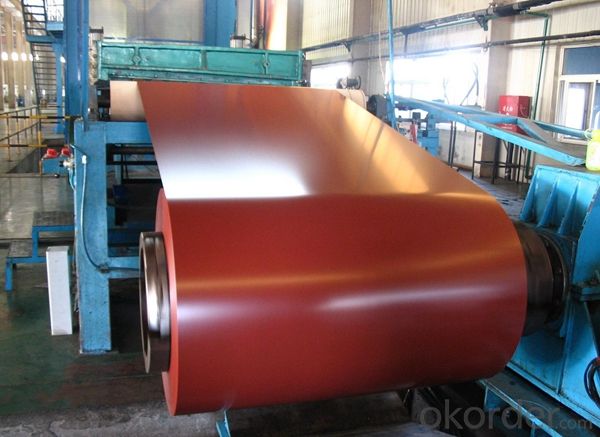
6. Package and shipping of Color Coated Aluminum Coil for Wall System
eye to wall
eye to the wall
with wood pallet (wooded case also available)
7. FAQ
1) What is the delivery time?
Dpends on actual order, around 20 to 35 days
2)What is the QC system:
We have QC staff of 20 persons and advanced equipment, each production is with MTC traced from Aluminum ingot lot.
3) What market do you mainly sell to?
Australia, America, Asia, Middle East, Western Europe, Africa etc
- Q: Are aluminum coils suitable for pharmaceutical packaging?
- Yes, aluminum coils are suitable for pharmaceutical packaging. Aluminum is a widely used material in the pharmaceutical industry due to its excellent barrier properties, durability, and flexibility. It provides effective protection against moisture, light, oxygen, and other external factors that can degrade the quality and stability of pharmaceutical products. Aluminum coils can be easily formed into various shapes and sizes, making them ideal for packaging different types of pharmaceutical products such as tablets, capsules, and ampoules. The ability to customize the packaging according to specific requirements ensures that the products are properly sealed and protected during storage and transportation. Furthermore, aluminum is non-toxic and chemically inert, meaning it does not react with the contents of the packaging. This is crucial for pharmaceutical products as it ensures the integrity and safety of the medication. Aluminum coils also have excellent heat conductivity, making them suitable for heat-sealing processes commonly used in pharmaceutical packaging. In addition to its functional properties, aluminum is a sustainable and environmentally friendly choice for pharmaceutical packaging. It is easily recyclable, reducing the environmental impact and promoting sustainability in the healthcare industry. Overall, aluminum coils are highly suitable for pharmaceutical packaging due to their barrier properties, flexibility, customization options, non-reactivity, heat conductivity, and sustainability.
- Q: This question asks for a comparison between aluminum coil and iron coil, highlighting their distinct properties and uses.
- <p>Aluminum coil and iron coil differ in several aspects. Aluminum coil is lightweight, corrosion-resistant, and has excellent electrical and thermal conductivity, making it ideal for electrical wiring, heat sinks, and food packaging. Iron coil, on the other hand, is heavier, stronger, and more durable, commonly used in construction, automotive, and heavy machinery due to its high tensile strength. Iron also has magnetic properties, useful in applications like transformers and electromagnets. While aluminum is non-magnetic, it is more cost-effective and has better recyclability compared to iron.</p>
- Q: How are aluminum coils coated to enhance their durability?
- Aluminum coils can be enhanced in terms of durability through various methods of coating. One popular approach is by applying a protective coating, such as polyester or acrylic resin, onto the coils using a technique known as coil coating. This can be achieved through roll coating or spray coating. The purpose of the coating is to create a barrier between the aluminum and external elements like moisture, UV rays, chemicals, and abrasion. By doing so, it prevents corrosion, oxidation, and damage caused by exposure to the environment. The choice of coating type and its thickness can be adjusted according to the desired level of durability and the specific purpose of the aluminum coil. Apart from protective coatings, additional treatments can be applied to aluminum coils to further enhance their durability. These treatments may include pre-treatment processes like cleaning, etching, and chromating, which improve the adhesion of the coating to the aluminum surface. Other treatments may involve the application of primers or topcoats to offer extra protection and enhance the appearance of the coil. Overall, the process of coating aluminum coils enhances their durability by providing a protective layer that can withstand harsh environmental conditions, prolong their lifespan, and preserve their appealing appearance.
- Q: I would like to know because I'm getting a sword with an aluminum sheathe.
- That would depend on The Alloy and the Condition The alloy is the elements in percent that make up that material. The Condition is the heat treat of that alloy. Reffered to as Treatment when it comes to Aluminum Examples: 2024 T4 6061 T6 6063 T6 7075 T7 Etc,etc,etc,etc.................... Saying the word Aluminum is like saying the word Wood (Which One?) Aluminum can range from..what is this stuff,so soft and bends so easy To what the hell is this stuff, so dam hard stiff,and it just won't bend!! Oh,and 30 year boy........sit down.......30 years,and that is all you could come up with!!!! 30 years of drinking coffee,joking with the boss,and goofing off.You may want to sit the beer down and read up on the material you have been working with for 30 Years!!!!!
- Q: Describe the manufacturing steps involved in producing aluminum coils.
- <p>The production processes of aluminum coils involve several key steps. Initially, aluminum ingots are melted in a furnace. The molten aluminum is then transferred to a casting machine where it is cast into a continuous strip. This strip is cooled and passed through a series of rollers to reduce its thickness and achieve the desired coil gauge. The rolling process can be hot or cold, depending on the final product's properties. After rolling, the aluminum coil may undergo annealing to improve its ductility and strength. It is then cleaned, oiled, and wound into coils. Quality control checks are performed throughout the process to ensure the coils meet specific standards. Finally, the aluminum coils are packaged and shipped for various applications such as construction, automotive, and packaging industries.</p>
- Q: This question asks for methods to clean an aluminum coil, which involves understanding the appropriate cleaning materials and techniques to avoid damaging the aluminum.
- <p>To clean an aluminum coil, start by using a soft cloth or sponge dampened with warm water and mild dish soap. Gently wipe the coil to remove dirt and grime. Avoid abrasive materials or harsh chemicals that could scratch the surface. After cleaning, rinse the coil thoroughly with clean water to remove any soap residue. Dry the coil completely to prevent water spots or corrosion. For stubborn stains, consider using a specialized aluminum cleaner, but always follow the manufacturer's instructions and test on a small area first.</p>
- Q: I'm asking about the aluminum tabs on soda cans. I've heard mixed things.
- Most all Metal Recyclers will pay you for your scrap aluminum. The can tabs are considered to be 'clean' when they have no anodized color or paint on them, and you should get top price in the clean aluminum category. Otherwise you can do as I do and donate them to a charity of your own chosing, I also take the cans back to the retailers for proper recycling (and my deposit back) . I donate my tabs to the Amvets and they use them for the various projects and things they give at the Veterans Hospital.
- Q: Can aluminum coils be used in signage applications?
- Yes, aluminum coils can be used in signage applications. Aluminum is a popular material for signage due to its durability, lightweight nature, and resistance to corrosion. It can be easily formed into various shapes and sizes, making it suitable for different types of signage, including billboards, nameplates, and outdoor signs. Additionally, aluminum can be painted or laminated to achieve different visual effects and enhance the overall appearance of the signage.
- Q: I have completely disassembled my aluminum bass boat and it is being sandblasted.I am restoring the boat and will be giving it a new paint job.What do you recommend in the way of primer,paint or anything else I need to know.I just don,t want to mess it up by using the wrong thing.Best answer gets a fishing trip in the same boat we are talking about. If you can make it here I will put you on some fish.Catfish,bream,crappie,bass or even saltwater fish.
- Contact the manufacture and see what they used as it held up for quite a few yrs. Primer for aluminum is the beginning.
- Q: This question asks for the distinctions between aluminum coil and steel coil, focusing on their properties and uses.
- <p>Aluminum coil and steel coil differ in several aspects. Aluminum coil is lightweight, corrosion-resistant, and has good thermal conductivity, making it ideal for applications requiring flexibility and resistance to weathering. It's commonly used in construction, packaging, and electrical applications. Steel coil, on the other hand, is stronger and more durable, suitable for heavy-duty applications. It's often used in automotive, construction, and manufacturing due to its high strength and ability to withstand heavy loads. Steel is also magnetic, which is a property not shared by aluminum. The choice between aluminum and steel coil depends on the specific requirements of the project, such as weight, strength, and environmental resistance.</p>
Send your message to us
Paint Aluminum Coil for Wall System
- Loading Port:
- Shanghai
- Payment Terms:
- TT OR LC
- Min Order Qty:
- 5 m.t.
- Supply Capability:
- 10000 m.t./month
OKorder Service Pledge
OKorder Financial Service
Similar products
Hot products
Hot Searches
Related keywords
